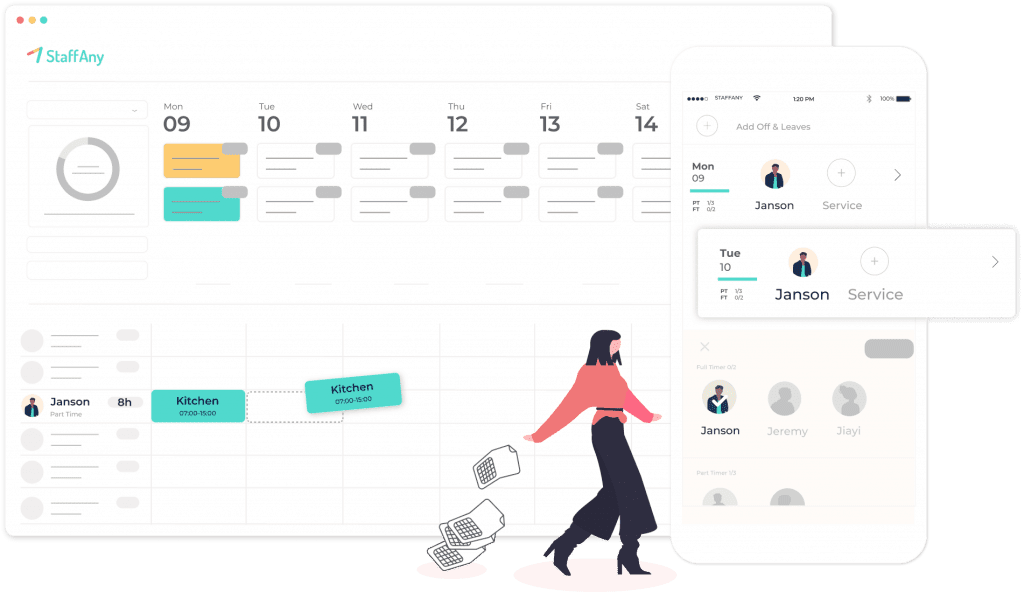In today’s fast-paced world, businesses need to operate 24/7 to keep up with the demands of customers, especially the F&B industry. As restaurants, cafes, and bars serve customers throughout the day, the concept of rotational shifts has become increasingly popular. Rotational shifts are a method of scheduling work shifts that can provide numerous benefits to F&B businesses.
In this article, we’ll explore the meaning of rotational shift, how it works, the types of rotational shifts, and the benefits it can bring to the F&B industry.
What Is a Rotational Shift?

Rotational shifts work by rotating employees through different shifts at different times. The specific rotation schedule varies depending on the company’s needs and preferences. For instance, a company might choose to rotate employees on a daily, weekly, or monthly basis. To implement rotational shifts effectively, businesses need to have a system in place that allows them to manage the schedules of their employees efficiently.
Read more: Basic Salary in Malaysia and Its Regulations
Types of Rotational Shifts

There are several types of rotational shifts that businesses can implement to ensure they operate efficiently and smoothly around the clock. The most common types of rotational shifts include:
1. Fixed Rotation Shifts
Fixed rotation shifts are a schedule in which employees work a specific rotation pattern. For example, employees may work the same shift for a week or two, then rotate to another shift for a similar period. This type of rotation can be helpful for employees who prefer consistency and allows for better planning of work and personal life.
2. Cyclical Rotation Shifts
Cyclical rotation shifts are a schedule in which employees rotate through a series of shifts in a cyclical pattern. This means that they will work day shifts for a specific period, then switch to night shifts for a set period before rotating back to day shifts. This type of rotation is helpful for businesses that require 24-hour operation and ensures that all employees have an equal opportunity to work day and night shifts.
3. Slow Rotation Shifts
Slow rotation shifts are a schedule in which employees rotate through shifts at a slower pace than fixed or cyclical rotation shifts. For example, employees may work a day shift for a week, then rotate to a night shift for a few weeks before returning to the day shift. This type of rotation allows employees to experience a variety of shifts, which can be helpful for preventing boredom and improving employee morale.
Each type of rotational shift has its advantages and disadvantages, and businesses need to determine which type best fits their needs. It is essential to ensure that the schedule is communicated effectively to all employees to ensure that everyone is aware of the plan and how it works.
Read more: Graveyard Shift: Meaning, Advantages, and Disadvantages
Benefits of Using Rotational Shifts in the F&B Industry

The F&B industry is a fast-paced, highly competitive industry that requires businesses to operate efficiently to be successful. Implementing rotational shifts can provide numerous benefits to the F&B industry. Here are some of the benefits of using rotational shifts in the F&B industry:
1. Improved Employee Morale and Retention
Working the same shift repeatedly can lead to employee burnout and decreased morale, which can negatively impact job satisfaction and staff retention. Rotational shifts allow employees to work different shifts, preventing monotony and promoting engagement. This can lead to increased employee morale and retention, reducing turnover rates and the associated costs.
2. Efficient Staffing
The F&B industry operates throughout the day and night to serve customers, and rotational shifts allow businesses to adjust their staffing levels based on demand. It ensures that there are enough staff members to cover all shifts, reducing labour costs during periods of low customer traffic.
Read more: Understanding Employee Management System and Its Benefits
3. Better Customer Service
Rotational shifts ensure that there are always employees available to provide excellent customer service, regardless of the time of day. This can lead to higher customer satisfaction rates and increased customer loyalty, which can positively impact the business’s reputation and bottom line.
4. Increased Productivity
Rotational shifts can help to improve employee productivity by preventing boredom and ensuring that employees are engaged and motivated. When employees are motivated, they are more likely to work efficiently and complete their tasks promptly.
5. Work-Life Balance
Rotational shifts can provide employees with a better work-life balance. By working different shifts, employees can better plan their personal life and have more time for other commitments such as family, education, or hobbies. This can lead to increased job satisfaction and improved employee retention rates.
What Industries Use Rotating Shifts?
Rotating shifts are commonly used in industries that require continuous operations or 24/7 coverage. Here are some industries where rotating shifts are commonly employed:
1. Healthcare
Hospitals, clinics, and emergency medical services often operate on a 24/7 basis, requiring healthcare professionals, including nurses, doctors, and support staff, to work rotating shifts.
2. Manufacturing
Industries involved in manufacturing and production, such as automotive, aerospace, and pharmaceuticals, often require round-the-clock operations. Workers in these industries may be assigned to rotating shifts to ensure continuous production.
3. Public Safety
Police departments, fire departments, and emergency services operate at all hours. Officers, firefighters, and emergency responders may work rotating shifts to provide public safety around the clock.
4. Transportation
Airlines, public transportation services, and shipping companies require staff to operate on rotating shifts to ensure the continuous movement of goods and people.
5. Energy and Utilities
Power plants, water treatment facilities, and other utilities often operate non-stop. Employees in these industries, including operators and maintenance staff, may work rotating shifts.
6. Call Centers and Customer Support
Call centers that provide customer support or handle emergency services often operate 24/7. Agents in these centers may be assigned to rotating shifts to cover different time zones.
7. Hospitality and Entertainment
Hotels, restaurants, and entertainment venues frequently operate during evenings and weekends. Employees in these industries, such as hotel staff, chefs, and event staff, may work rotating shifts.
Read more: 11 Examples of Good Customer Service in F&B Industry
8. Security Services
Security personnel, whether providing services for businesses, events, or critical infrastructure, often work rotating shifts to maintain a constant security presence.
9. Information Technology (IT)
IT professionals working in roles that require continuous monitoring and support, such as network operations centers (NOCs) and data centers, may work on rotating shifts.
10. Retail
Some retail establishments, particularly those that operate extended hours or are open 24/7, may assign employees to rotating shifts, especially in positions like store management or security.
11. Emergency Services
Emergency services, including paramedics, dispatchers, and search and rescue teams, often work on rotating shifts to respond to incidents at any time.
The use of rotating shifts is often driven by the need for continuous operations, and it’s a common practice in industries where services must be provided without interruption.
However, it’s important to note that while rotating shifts provide operational continuity, they can also pose challenges to the well-being and work-life balance of employees.
Read more: 11 Factors to Consider When Scheduling Staff
Streamline your Shift Scheduling Process with Employee Scheduling Software

Implementing rotating schedule in the F&B industry can provide several benefits for both the business and its employees. It can improve employee morale, retention, and productivity, provide a better work-life balance, and ensure efficient staffing and excellent customer service.
By considering the different types of rotating shifts and effectively managing employee schedules, businesses can ensure that they operate efficiently and effectively around the clock.
Incorporating rotating shifts in your F&B business can be beneficial, but managing employee schedules can be a challenge. That’s where StaffAny’s employee shift scheduling software comes in.
With StaffAny, you can easily manage employee schedules, create customised shift patterns, and communicate with your staff all in one place. Here are some benefits you can get by implementing StaffAny’s employee schedulling system:
1. Real Time Availabilities
With a connected workforce, know the team availability, who is on leave, and which of your part-timers are available before planning for your A-team in a familiar interface.
2. Schedule Your Staff In One Click with Auto-Scheduling
We understand that speed and accuracy are everything. Just by clicking on the shifts, you instantly assign your staff to a shift. We provide you with schedule templates that can be customised based on your needs.
3. Get Better Visibility of Labour Costs While Scheduling
Food service managers can take control of actual labour costs to optimise and achieve target manpower budget and lower operating costs to increase your take-home profits.
Our user-friendly software is designed to simplify scheduling processes and help businesses save time and money. With features such as scheduling with one click, schedule templates, and real-time schedules update, you can ensure that your business is always staffed appropriately, even during peak hours.
Ready to streamline your scheduling processes and improve your business’s efficiency? Contact us here to get started!











